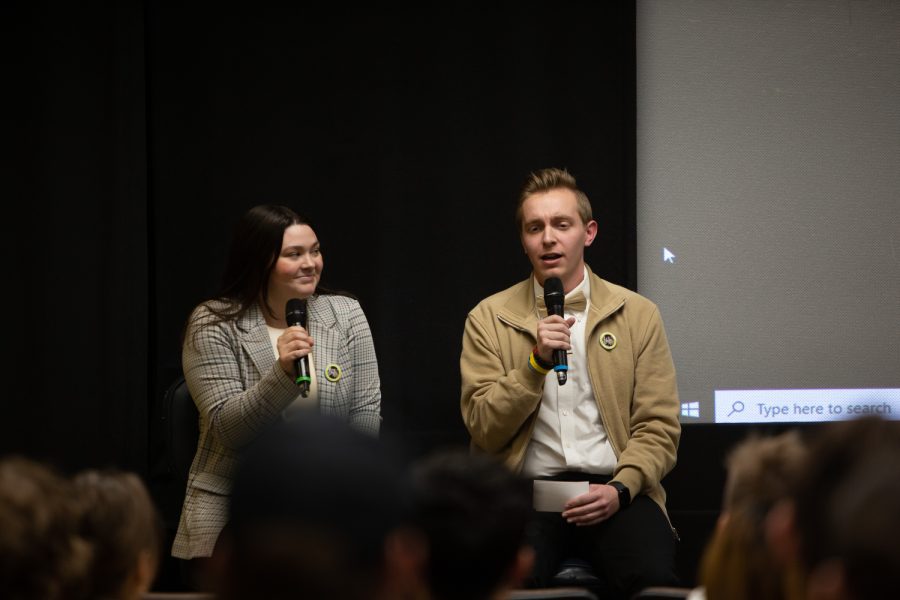UI USG hosts executive ticket debate for candidates
The two executive tickets answered questions related to leadership ability, initiatives for next year, and the tenets of their campaigns.
Candidates Carly O’Brien and Mitch Winterlin speak during a University of Iowa Undergraduate Student Government debate in the Iowa Theater in the Iowa Memorial Union on March 26, 2023.
March 26, 2023
The University of Iowa Undergraduate Student Government’s executive candidates met on Sunday in the Iowa Theatre of the Iowa Memorial Union for an hour-long debate ahead of the government’s election this week.
Vera Barkosky is running for president with Robert Jepsen as vice president, and Mitch Winterlin is running with Carly O’Brien.
“Our 2023 campaign platform, LEAD: Listen, Engage, Advocate, and Deliver, outlines all of our comprehensive student outreach programs and actionable initiatives that Robert and I hope to implement in the upcoming administration,” Barkosky said.
Barkosky said she believes their ticket is unique because they will be able to start work immediately as a result of of their established connections and leadership in USG.
“We understand that constituencies really require more support from us and more understanding, more presence, and also what change has yet to be effected, and through all of those things, we believe, and we bonded over how we can cultivate a stronger community forever,” Barkosky said.
Winterlin, the current undergraduate student government director of student services, and his running mate Carly O’Brien, the current undergraduate student government director of operations, named their campaign “Marly for M.O.R.E.”
The acronym stands for Winterlin and O’Brien’s campaign goals of mental health, outreach, revitalization, and equity. Winterlin said he hopes to continue his work with the Paws at Iowa club to get therapy dogs into each college at the UI.
Additionally, O’Brien said the pair hopes to encourage students to come to them if they have issues they want to address at the UI through the goal of outreach.
“Outreach and transparency is something we are very excited about,” O’Brien said. “We actually want to move our office hours one day a week to here on the first floor of the IMU with weekly talks with the pres[ident] or with the VP booth so we can really actually get that foot traffic.”
Winterlin said revitalizing means analyzing the current structures both in and outside of student government, especially in terms of financial transparency.
“There is sometimes a lot of misguidance and mismanagement of funds, so we really want students to be able to see what we’re doing and how they’re able to access those things,” he said.
RELATED: UI USG announce changes to election code to increase accessibility
Along with financial transparency, Winterlin also wants to require one-on-one sit-down meetings with USG members to ensure understanding and minimize miscommunication as an answer for decreasing separation within the government.
“Sometimes cabinet, the presidency, vice presidency, everything seems so elitist all of a sudden and it’s like, that isn’t what we’d like to see,” he said.
The pair is also advocating for more accessibility on campus. O’Brien, as a student receiving accommodations through Student Disability Services, said that equity will include standardizing ICON courses and helping communication between students and their professors.
Like Winterlin, O’Brien said she wants to eliminate some of the privilege in executive positions by increasing invitations to members of other branches for events with administrators, such as the UI president.
When asked how to decrease separations between the executive and other branches within the UI USG, Jepsen said it is important for leaders to be receptive.
“It really is about listening, sitting down with these members of USG, the senators, the committee chairs, the executives, and hearing what problems they’re dealing with, hearing what they need to succeed and what we as leaders can do to help them,” Jepsen said.
Barkosky said her campaign is brainstorming an action item to bring unique perspectives and experiences together.
“We plan to meet with student leaders, each of which have had different walks of life, and as well as established student organizations monthly to really discuss cross campus initiatives, organizational efforts, how we can constantly be better, or bettering our internal structures and cultivating those positive work environments,” Barkosky said.
She and Jepsen also plan to continue open dialogue with the cultural centers on campus.
“Some other actions in our platform that we think will really help with this are our monthly town halls where we take questions from students at Iowa and just hear their complaints, hear their struggles at Iowa, or what they want to see for Iowa moving forward,” Jepsen said.
Following the debate, some attendees were torn on who to vote for.
Sen. Brenda Ramirez said she thinks choosing who to vote for will be a difficult choice.
“I’m excited to see who ends up winning the ticket, and I’m excited to see what they do and see if they actually implement any of their ideas,” Ramirez said.
Sen. Addison Eckard said the debate increased her confidence in who she was voting for, which she did not disclose to The Daily Iowan.
“I think a lot of things were said that really led me to sticking with who I’m voting for,” Eckard said.



